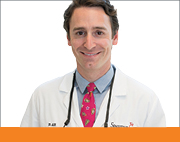Dr. Quintner Explores the Surgical Side of General Dentistry
 Alexander C. Quintner, DMD, MAGD, always knew he wanted to be a doctor of some kind. “I had an affinity for science when I was young, and I always wanted to be involved in helping when someone got hurt,” Quintner said. “Having the skill set and the knowledge to help when people are sick was really appealing to me. Having a direct impact on someone’s well-being is a powerful thing.”
Alexander C. Quintner, DMD, MAGD, always knew he wanted to be a doctor of some kind. “I had an affinity for science when I was young, and I always wanted to be involved in helping when someone got hurt,” Quintner said. “Having the skill set and the knowledge to help when people are sick was really appealing to me. Having a direct impact on someone’s well-being is a powerful thing.” Still, Quintner took a while to decide on dentistry and debated between going to medical or dental school. In the end, he decided on dentistry because of the exposure he had through his father, a general dentist, and the opportunities he felt would be available to him. Since then, it’s been full steam ahead.
"Having the skill set and the knowledge to help when people are sick was really appealing to me. Having a direct impact on someone’s well-being is a powerful thing."
“The thing about dentistry is that it’s so open-ended,” Quintner said. “As a general dentist, you can really take your skill set into any part of dentistry that appeals to you. For me, that’s been surgery.” Quintner attended a general practice residency where the director, a periodontist, felt strongly that general dentists should be able to place implants, so he placed a handful of implants during his residency, then went on to complete an in-depth implant continuing education course.
“Being able to replace a tooth after someone has lost it in a very modern, minimally invasive way — I thought that was really cool,” Quintner said. During dental school and his residency, he was also exposed to several modern implantology and digital technologies, such as CBCT imaging, CAD/CAM and guided surgical techniques, which further solidified his interest in highly technological surgical dentistry.
Quintner joined his father’s general practice in Milford, Connecticut, which focused on cosmetic and family dentistry but also staffed a part-time periodontist. In order to support the periodontist’s work, the practice was outfitted with much of the specialized equipment and inventory for implant and bone grafting procedures, like a CBCT scanner and CAD/CAM milling machine. Quintner was able to further develop his surgical skills with the added benefit of the periodontist’s review. He also sought out and developed a mentoring relationship with a local periodontist, whom he shadowed one day a week for a year.
Quintner and his father further expanded their practice by adding two general dentists and three part-time specialists — a pediatric dentist, an oral surgeon and an endodontist. Even among the four general dentists, Quintner says they all have different interests — his father prefers cosmetic and prosthodontic cases, while he also takes on tissue grafting, implant and surgical cases; the other two general dentists do a lot of clear aligner orthodontics. Having this many providers with different skills and interests under one roof means more technological capabilities and room for skill development across the practice — and more options for patients.
“The patients love the experience of coming to a place they already know and seeing people they know, and we’re able to maintain control over the patient experience,” Quintner said. “We can tag-team treatment between the specialists and the general dentists. For example, the general dentist can come in the room and answer any questions the endodontist may have on the fly about the restorability of a tooth. After the endodontic treatment is completed, the general dentist can also build up the tooth, and the patient doesn’t have to go from office to office. It also solves a lot of the communication problems that can happen around referrals, because we know the specifics of the patient’s history and their insurance benefits.”
Recently, Quintner and his father rebranded their practice from Sensitive Care Cosmetic & Family Dentistry to Sensitive Care Dental Health Center to reflect the expanded scope among their eight clinicians and the practicewide focus on whole-health dentistry. With a successful, growing practice, Quintner has this advice for other general dentists:
“I think we’re all a little scared about what’s happening with corporate influence in dentistry,” he said. “You’re up against the big boys now when you try to market your practice. I don’t have the same financial resources that a private equity firm does. My advice would be to do a better job than your competitors once the patient walks through your door. Be ethical, treat people well, get trained, and be good at your job — you’ll end up with more business being a good dentist first than if you try to be an aggressive businessman.”
